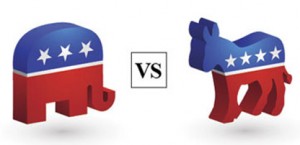 While there is an ideological divide between Conservatives and Progressives, it’s not clear this is the fundamental chasm between the camps. It may be rooted in their respective worldviews. After all, the end goals of both sides are aligned. Everyone wants peace, prosperity, health, safety, and a good standard of living for their children.
While there is an ideological divide between Conservatives and Progressives, it’s not clear this is the fundamental chasm between the camps. It may be rooted in their respective worldviews. After all, the end goals of both sides are aligned. Everyone wants peace, prosperity, health, safety, and a good standard of living for their children.
However, the apparent difference in the paths to get to this end state are misleading. Stereotypes say Democrats are for big government, social safety nets, and wealth redistribution. They are pro-union and anti-business. They are for protecting the environment and personal freedoms. Meanwhile, the Republicans are all about small government, fiscal austerity, and low taxes. They are defenders of capitalism and building businesses. They stand for freedom, morality, and clean living.
Those are the stereotypes. Yet the data doesn’t bear that out. Republicans have grown government and deficits. They created the Medicare Part D social safety net, and allowed passage of the Patriot Act restricting many freedoms. Meanwhile, Democrats have cut taxes, stood against teacher’s unions, and pushed agendas like offshore drilling with dire environmental consequences.
It would seem the ideologies are not as rigid as we might imagine. Rather, the distinction lies in how the two sides view rules. For Conservatives, rules are all about absolutes. Something is right or it’s wrong, good or evil, black or white. All the while Progressives are lost in the gray. Everything is conditional.
For Conservatives, business regulation is bad, raising taxes are bad, guns are good. For Progressives, it’s not so much that those values are flipped, but rather there is a level at which they are appropriate. Business should not be allowed to exploit citizens, taxes should be collected to cover expenses, and guns should be regulated to contain violence. Yet here is where it gets tricky.
Progressives can’t even agree among themselves where these lines should be, and because of that are unable to walk in lock-step like their counterparts. Further, the notion that these lines should be left open to future interpretation by activist judges makes Conservatives very nervous. The result being that Progressives find Conservatives to be overly rigid and dogmatic, while Conservatives find Progressives to be wishy-washy and disorganized.
This dichotomy of worldview is the bright line distinguishing the camps. It is why the right is so often accused of hypocrisy as it’s hard not to occasionally color outside the bold black lines. And it’s why the left is so often accused of flip-flopping or compromising as the world they see is so highly conditional.
The ideological divide is not what keeps us apart. It’s all about how we view the rules.
